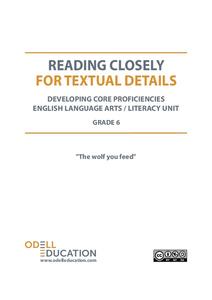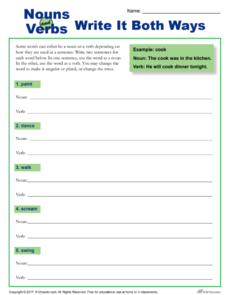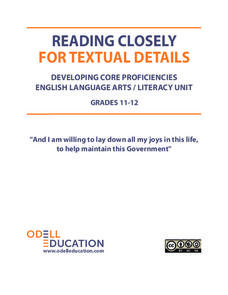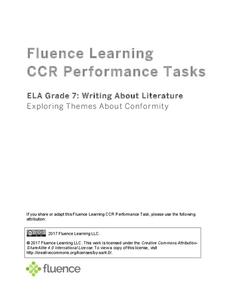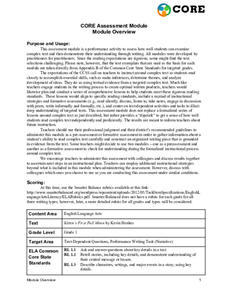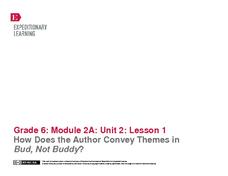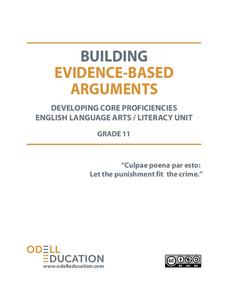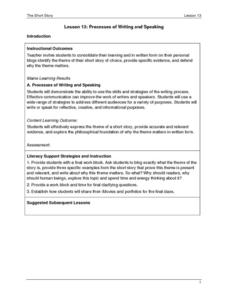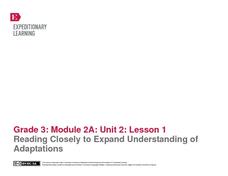Odell Education
Reading Closely for Textual Details: Grade 6
Close reading doesn't mean to literally read text close to your face, but rather to pay attention to particular details in order to develop a deep and purposeful understanding of text. The first part of a five-part resource provides an...
Poetry4kids
How to Write an Apology Poem
Put a silly spin on making amends with an apology poem. Budding poets think of a time they were made to apologize although they didn't mean it. They then turn their experience into a poem that offers details and ends with an explanation...
Curriculum Corner
Informational Text Graphic Organizers
Examine informational text with a three-page worksheet that focuses on taking notes, identifying the main idea, and locating supporting details in order to form a summary paragraph.
Lakeshorelearning
Read and Write about It
Reading informational text is a skill that transcends subjects and grade levels. Practice reading about different topics in various formats with a language arts lesson that includes opportunities for writing and research as well.
Fluence Learning
Writing About Informational Text: Everybody Can Bike
A three-part assessment challenges scholars to read informational texts in order to complete three tasks. Following a brief reading, class members take part in grand conversations, complete charts, and work in small groups to research...
K12 Reader
Nouns Verbs: Write it Both Ways
A five-item worksheet challenges scholars to write two sentences using the same verb in two different ways—as a noun and a verb.
Odell Education
Reading Closely for Textual Details: "And I am willing to lay down all my joys in this life..."
Look closely, some details are hidden! Scholars learn how to find attributes by first examining characteristics in illustrations and then move to locating details in text with close reading. The teacher models good practices for...
Polk Bros Foundation
Common Core Constructed Response Organizer
Get your writers ready to compose a constructed response essay in response to either an informational or fictional text. Pupils note down the big idea they wish to address as well as up to nine examples from the text that they wish to...
Curated OER
Nonfiction Genre Mini-Unit: Persuasive Writing
Should primary graders have their own computers? Should animals be kept in captivity? Young writers learn how to develop and support a claim in this short unit on persuasive writing.
ReadWriteThink
A Picture's Worth a Thousand Words: From Image to Detailed Narrative
A picture's worth a thousand words—and even more inspiration! A visual activity uses photographs to inspire writers. The process teaches aspects of narrative writing, such as point of view and characterization.
Fluence Learning
Writing About Literature: Exploring Themes About Conformity
Feeling the pressure to confirm is something any adolescent can relate to. Explore an essential theme with a response to literature assessment that prompts learners to identify main ideas with evidence and supporting details.
California Education Partners
Kitten's First Full Moon by Kevin Henkes
A 3-day exam assesses readers' comprehension. After hearing a passage from the story Kittens First Full Moon by Kevin Henkes, scholars work with a partner to discuss and sketch what they found memorable. Peers share their final products...
Curated OER
The Rumpelstiltskin Story
Why didn't Rapunzel's hair stop growing? Why did it take the fairy godmother so long to intervene in Cinderella's affairs? Young writers consider unanswered questions like these and compose news articles investigating the true story...
EngageNY
How Does the Author Convey Themes in Bud, Not Buddy?
After reading up to chapter 12 of Bud, Not Buddy by Christopher Paul Curtis, scholars read chapter 13 and take part in a grand conversation about the author's writing techniques. Pupils discuss how his writing conveyed literary themes...
Odell Education
Building Evidence-Based Arguments: "Cuplae poena par esto: Let the punishment fit the crime."
Should a criminal's punishment match the crime? An argumentative writing plan explores this question as class members investigate a variety of mixed-medium sources by experts in the field, form evidence-based claims, and support them...
Union Elementary School District
Famous Dead People Project
Despite the slightly off-putting title, the instructions and activities detailed in these project guidelines for researching a noteworthy figure will serve as a fantastic supplement to your next famous person research assignment.
Berkshire Museum
Nature Journaling: Experience the Outdoors Through Writing and Drawing
Step into the great outdoors and develop young scientists' skills of observation with a nature journaling lesson. Given a specific focus or goal, children practice making and recording observations of nature through written descriptions...
Maine Content Literacy Project
Processes of Writing and Speaking
As this short story unit comes to a close, provide a day for a full examination of theme and allow some time in class for individuals to work on their various assessments. This final lesson before presenting iMovies and portfolios is the...
Curated OER
Express Yourself Lesson Seed 12: Story Event
Focus on plot and the impact-specific events in The Cay. Class members use their double-entry journals, created in a previous lesson in this series, to record their thinking about the guiding question as they read chapters 15 through 17....
Scholastic
Writing Letters of Gratitude
A lesson begins with a discussion on gratitude—what does it mean, and for who are learners thankful? Scholars share their thoughts and feelings then choose a community worker to which they wish to share their gratitude. Writers compose a...
EngageNY
Grade 9 ELA Module 4, Unit 1, Lesson 6
How do writers create a specific tone in their text? As class members continue their study of Sugar Changed the World, they focus on the words and phrases that Aronson and Budhos use to create that tone in their descriptions of arduous...
EngageNY
Reading Closely to Expand Understanding of Adaptations
Third graders work to determine the main idea, recall key details, and answer questions using an informational text on the topic of animal adaptations. Using the non-fiction text "Staying Alive: Animal Adaptations" (provided) the teacher...
California Education Partners
Covers by Nikki Giovanni
Over three days, scholars listen to and read the poem, "Covers" by Nikki Giovanni. Learners complete a graphic organizer by sketching their visualizations from each stanza then discuss their pictures with a peer. Pupils answer...
K12 Reader
Describe It with Adjectives
Put children's descriptive writing skills to the test with these fun collaborative writing activities. Presented with the picture of an object, young writers are are tasked with creating a description that provides enough detail for one...


